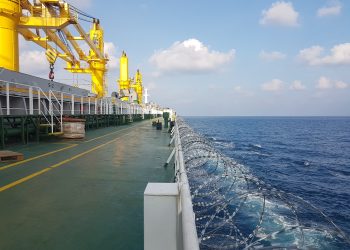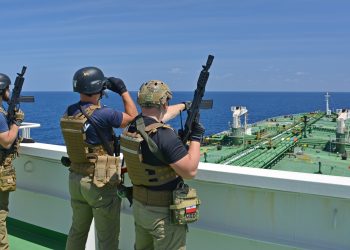Security contractors continue to search for a winning business model
 Within the grand scheme of global security threats, pirates are specks of dust. But over the past several years, successful ship hijackings have begun to take a toll on the world’s economy as Somalia-based pirates have expanded their area of influence beyond the East Coast of Africa, analysts said.
Within the grand scheme of global security threats, pirates are specks of dust. But over the past several years, successful ship hijackings have begun to take a toll on the world’s economy as Somalia-based pirates have expanded their area of influence beyond the East Coast of Africa, analysts said.
Pirate activity in the Persian Gulf area alone cost the maritime industry between $6.6 billion and $6.9 billion last year, said Rick “Ozzie” Nelson, director of the homeland security and counterterrorism program at the Center for Strategic and International Studies.
Piracy peaked in 2011 in the area extending from the Red Sea to the North Indian Ocean, with attacks against 544 ships, CSIS estimated.
Security firms have rushed to capitalize on the shipping industry’s rising fear of pirates. Approximately 200 to 300 companies today specialize in protecting commercial ships and oil tankers from pirates. At least half these firms are based in the United Kingdom.
The anti-piracy business is not like most other private-security markets. One of the largest U.S. military and State Department security contractors, Blackwater, tried to make a run at the maritime security escort business. In 2007, it purchased a retired naval vessel, the 183-foot McArthur, and offered it for anti-piracy services. In the absence of customers, the company shut down the venture within months.
Industry analysts have blamed Blackwater’s failure on the company’s tainted reputation in Iraq and Afghanistan, but they have also noted that maritime security poses unique challenges for any security firm. Anti-piracy escorts charge for a service that many countries’ navies and coast guards provide for free. Naval warships and trained military crews are ship owners’ preferred anti-piracy weapons.
Naval vessels, however, are becoming rare luxuries as countries cut back on military spending and pirates continue to extend their sphere of operations.
Hiring armed crews today is the most economical option for shippers because there is so much competition for the business, said Michael G. Frodl, head of C-LEVEL Maritime Risks, a consulting firm. Guards can cost anywhere from $40,000 to $50,000 for a 10-day trip. After the 2008 global economic meltdown, many shipping and insurance companies began to feel pressure to cut costs. The downturn made the competitive security industry even more cutthroat. “The private security industry is being pressed by ship owners,” said Frodl. Companies in Abu Dhabi now are hiring retired military personnel from low-wage Asian countries as security guards for oil tankers, he said. “The industry is turning into a Wal-Mart.”
For many shippers, the cost of security is becoming an unaffordable burden. Ships can choose to take detours to avoid the more dangerous waters, but that drives up fuel costs. Today, some type of security aboard is a must for any ship that transits the waters off East Africa, the Persian Gulf and the North Indian Ocean. This maritime danger zone encompasses an area four times the size of Texas.
The shipping industry and insurers continue to debate whether there is an alternative to hiring armed guards. Blackwater’s misfortunes have not deterred others from venturing into the private security escort market. The latest entry is a U.K. startup called Convoy Escort Program, or CEP, which is backed by international shipping insurers JLT and Lloyds of London underwriters Ascot. CEP reported it has raised $40 million, and is recruiting investors to meet its $70 million estimated cost to build a private navy for anti-piracy work. Another firm, Typhon, has secured Asian financiers to launch a similar “close vessel protection” service.
U.S. security experts have cast a skeptical eye on private navies. They contend the business model is a losing one, because of the high cost of buying and maintaining equipment, which translates into higher prices for security services at a time when shipping companies and ship owners are financially strained, said Frodl. Economic woes in the shipping sector of late, Frodl noted, have prompted banks to recall loans and seize ships. The rising cost of security does not help, he added.
The shipping sector’s misery has opened up a huge opportunity for the security industry, said James Bridger, senior security and defense analyst at the Atlantic Council of Canada. “Shipping companies might be losing money, but private security companies in London are doing very well,” he said at a Center for Strategic and International Studies conference in Washington, D.C.
International criminal lawyer Roger L. Phillips argued that private navies might have a future if the shipping industry believes that the cost is justified. “Private security escorts promise to be available to individual ships throughout their journey in high-risk waters. Though the cost of such services could be significant, there is the promise of savings in insurance premiums,” Phillips wrote in the maritime security blog Communis Hostis Omnium.
Frodl does not believe ventures such as CEP will survive. “This solution has languished for almost two to three years without any real support, and it’s still doubtful it will take off as a business model until and unless a sizeable percentage of insurers indicate they would prefer private escorts.”
In the United States, just three companies dominate the maritime security business: Nexus Consulting Group, Trident Maritime Security Services and STS Security LLC. They provide armed crews – many of whom are former U.S. military – to protect ships.
Kevin Doherty, CEO of Nexus, does not see CEP-like private navies as viable competitors. “In the last couple of years we’ve seen that private navies don’t work … they are cost prohibitive.”
Ship owners and ship operators walk a tightrope when it comes to balancing security and profits, he said. “It’s a zero sum.”
Doherty estimated that shipping companies on average spend $60 million a month on security. He also believes that there is a larger untapped market. “The world is becoming more dangerous. People have to go to dangerous places to get key commodities.”
Shippers must pay high-risk insurance rates to operate in areas such as West Africa, the Straits of Malacca and the Gulf of Aden. Navies from more than 30 countries have conducted patrols in those areas, but they are not silver bullets, said Doherty. “It has deterred and caused some migration and cessation of piracy attacks.” Shippers cannot solely rely on governments to protect them, he said.
Pirates have evolved, said Doherty. They used to make their runs in tiny skiffs with Yamaha outboards. Now they bring bigger boats, rocket-propelled grenades and rapid-firing guns, he said. “Pirates have been able to reinvest and expand.”
One problem for U.S. security contractors is that they can’t compete on cost alone. American firms recruit retired Navy Seals or Marines, who are highly skilled, but also are more expensive. Wayne Long, CEO of Seafarer International LLP, said the maritime security industry needs to become more professionalized. “We should certify and license armed crews,” Long said. “That’s not being done now … Companies are recruiting guards at bars and pubs” without any way to verify their past work experience.
The U.S. government should consider offering certifications to security firms that would make them eligible to compete for contracts to protect U.S. flag vessels and American cargo carried by chartered vessels with foreign flags. The program’s expenses would be paid by ship owners, who would benefit from improved security, Long said.
He also questioned the viability of private navies for anti-piracy. Escorts are impractical, said Long. Somalis adjust their tactics to make it difficult for escort ships to respond quickly enough. “They hope, like the German U-2 boats in World War II, that when they attack one side of a ship, the escorts run over there and then another [group of pirates] hits on the other side, in the dark,” Long said.
Fighting pirates is difficult even for the U.S. Navy, he said. “The U.S. Navy hates brown water operations. It’s not geared or equipped for it. … Finding pirates is like looking for a needle in a haystack,” he said. “You can’t find them unless you commit a considerable amount of resources and time.”
Security experts increasingly believe that combating pirates will be futile until their safe havens are removed. Captured vessels now can be docked at any port in Somalia, where there is no government or law enforcement. “You can take a hijacked ship almost to any port in Somalia and get a ransom for the ship, the cargo and the crew,” Long said. As long as that country remains in anarchy, the monetary incentives for pirates will only increase. Ransoms paid last year reached $150 million.
This is a problem for the U.S. government, analysts said, because a portion of piracy money is being funneled to Al-Shabaab, the Somalia-based cell of al-Qaida. Frodl said U.S. intelligence reports indicated that as much as 20 percent of pirates’ ransom funds are turned over to Al-Shabaab militants.
Ultimately, the solutions to piracy are “land based,” said Doug Brooks, president of the International Stability Operations Association. Navies are not an effective means to deal with Somalia, he said at the CSIS conference.
Somali pirates operate in an area that is too large for naval vessels to patrol. High-risk waters cover more than 1.1 million square nautical miles of ocean. With about 25 naval vessels patrolling, each is responsible for 44,000 square nautical miles. “Given the limited number of naval vessels and vast distances involved, a maritime-focused effort will likely be insufficient to fully eradicate piracy in the region,” Nelson said.
He suggested that defeating Somali pirates requires some type of “onshore program.” While the use of private security on ships has become commonplace, the role of industry in combating piracy on land has not been widely discussed, said Nelson. “There is room for private entities to provide advice and assistance to Somali counter-piracy forces.”
By Sandra I. Erwin
Source: National Defense


























































